Adoration
Brace yourself: I love Obsession. I believe Dan Hallagan, through his Kayenta Games label, has created a masterpiece with this highly thematic title. I have a hard time not getting excited at the uttered name. There is no way I could cover every rule and nuance, but I plan to speak at length about the movement of a turn to help establish a portrait of the action before I offer a few too many thoughts.
Preparation
Honestly, the Entrance Hall to Obsession is to sit down with Elizabeth Gaskell or Jane Austen for a few minutes to orient yourself to the customs of the aristocracy, the plight of the poor, and a strong sense of Victorian fate. Mr. Dickens fits the bill exceptionally well along with either of the Brontë sisters. If you don’t have a text handy, then a reasonable binge of Downton Abbey will tug at all the right strings.
In fact, as much as I love the literary works that stretch from the Victorian era into the early 20th century, I honestly believe Downton Abbey is the most fit foundation for a game of Obsession. Maybe season two when Mary is most desperate and downcast about her future, or season three when the Earl of Grantham drops to his knees with tears over the loss of his fortune. Moments like these will set the table as much as any page, tile, or token. Oh, and hang on every word the Dowager Countess—Granny—has to say. She, more than any other, will teach you how to feel about your Guests.
Introduction
There are six potential families vying to re-enter the upper echelon of English society, two of which arrive via the game’s expansion content. These families will spend (their servants’) blood, sweat, and tears in every effort to advance in Wealth, Prestige, and Social connections with one purpose in mind: marry one of the coveted Fairchild children of Alderley Hall to cement a position and a future.
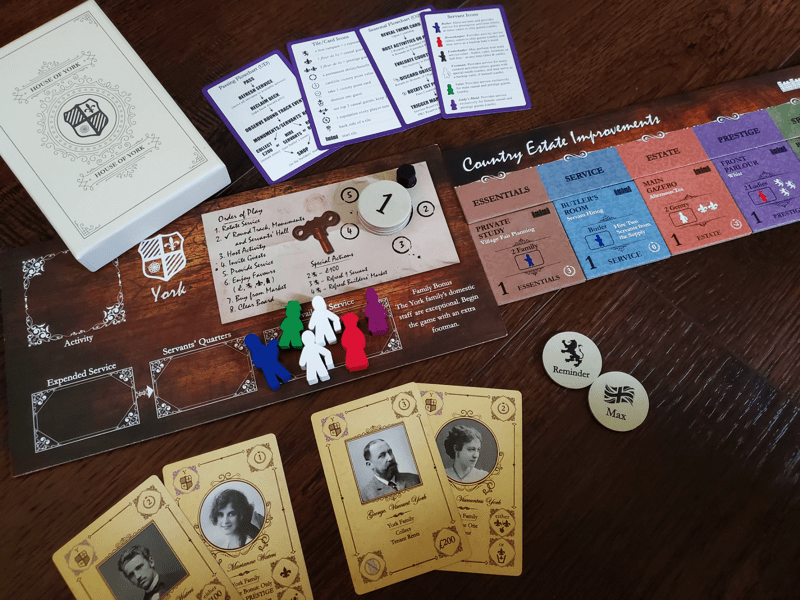
Having chosen one of these families, players receive a gorgeous little tuck box with everything needed to set up the player board, complete with a mild asymmetric advantage. Contents include Family cards, the most basic household Servants, several markers, and a sideboard that lays out the estate and the basic Activity tiles.
Exposition
After teaching Obsession several times, I’ve come to the conclusion that there is no better way to understand the game than to simply walk through a turn. I’ll explain the components along the way.
There are eight steps to the turn. First, any servants that have been employed in previous rounds Rotate nearer to availability. Servants are typically granted one turn of rest after carrying out an Activity.
Second, players receive any available Benefits from their estate or the Round Track. The Round Track varies depending on the desired game length, but there are several large scale happenings that provide bonuses or unique opportunities. These simply must be checked and enacted. If players have any Monuments in their estate, they gain one Prestige each. If they have the Servants’ Hall tile, they may deploy one Servant as a gossip to damage the reputation of another player. I know, it’s mean, but little is fair in this war for love.
Third, players choose an Activity to Host. The estate sideboard divides the Activity tiles into five types, distinguished by their colors. Activity choice is based on need and ability. Each activity grants Favours that advance the family in one category or another, but a certain Prestige level is always required beforehand, as well as at least one Servant.
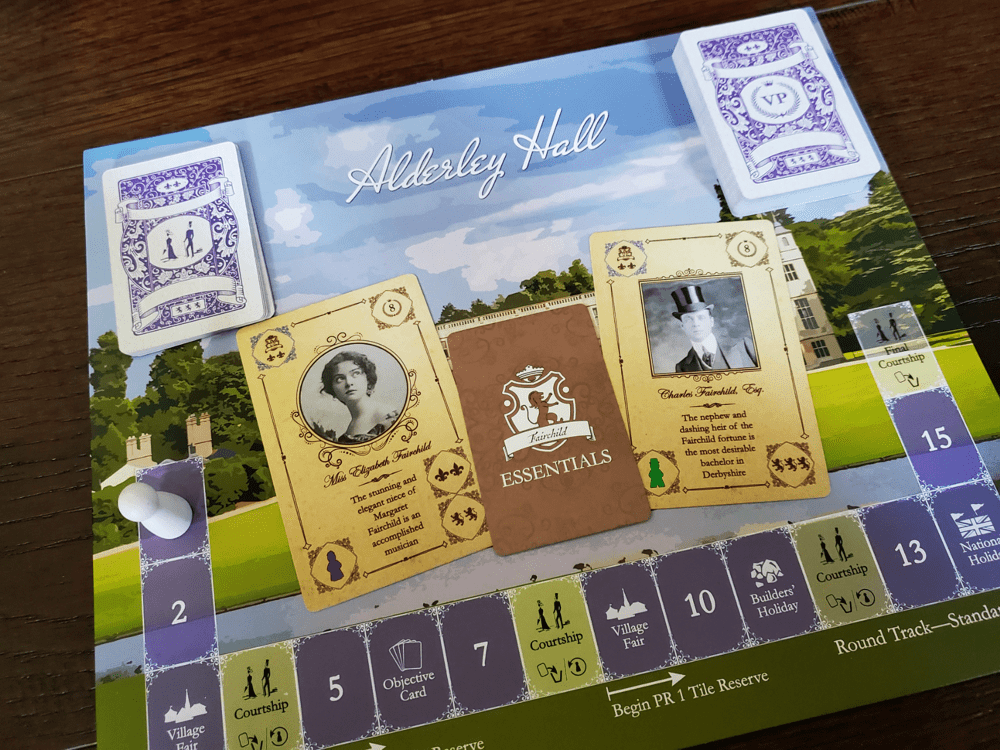
One final consideration in choosing an Activity is the current preference of the Fairchild heirs. The Round Track is also divided into four Courtship seasons. Each season, a new card is drawn, revealing the type of Activity that interests the famed children. The player whose tiles in that area boast the most current Victory Points at the end of the Courting season will bring a Fairchild into their Guest deck for the next season. During the final season, all the previous Fairchild fancies are totaled to determine the player who has earned wealthy marital bliss.
Each successive Courtship season begins with a Courtship Round in which one Fairchild departs to the victorious hand along with one Victory Point card.
Once the Activity is chosen, players must Invite Guests from their cards. Each Guest—which includes the family—in addition to having an endgame value in Victory Points, carries some blessing, curse, or both. Some arrive bearing Money, others bring Prestige, or introduce new Guests to the mix. Some bring one type of Favour, but leech another. Like the Activity, each chosen Guest must be accessible according to the family Prestige.
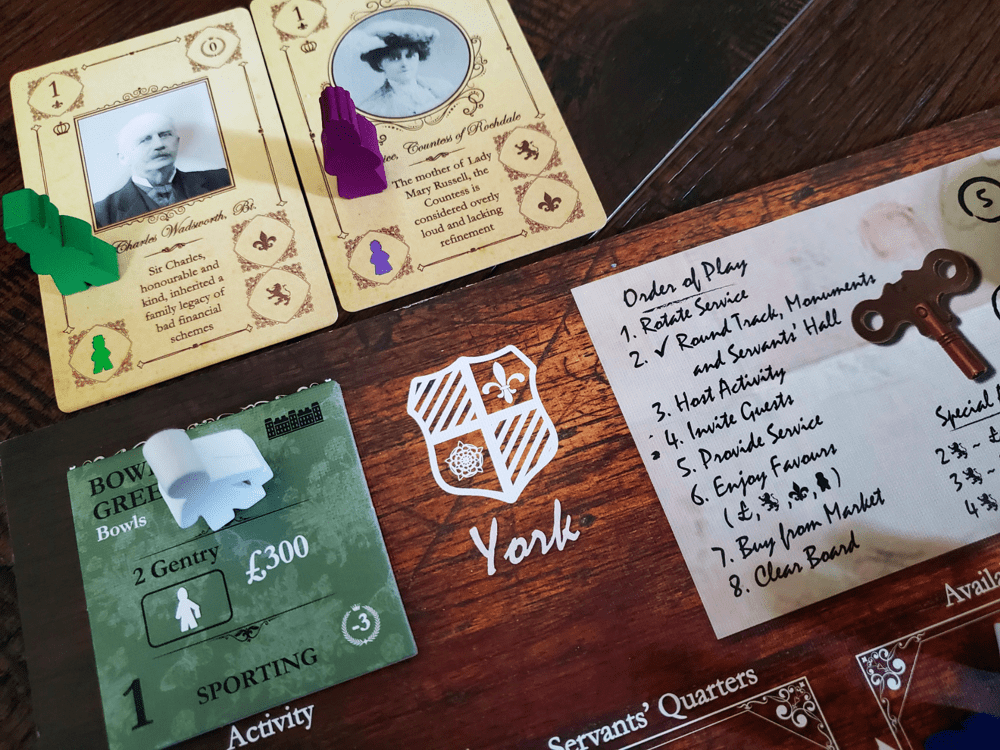
All come with flavor text that truly gives Obsession its character. I cannot emphasize this enough, you simply must read the flavor text. You must grow to love and lovingly dislike these individuals and all that they are doing to and for your family!! Not because you need this knowledge to win, but because the broader experience demands it.
Obsession is a deck-builder in the realm of Guests. The deck is ever-growing and always in use. Guests move to personal discard piles after each Activity, waiting for a Passing turn in which everything is reset and the full Guest deck is once again available.
Having chosen Guests, players must provide the proper Service all around. Planning the proper use of the servants is one of the most enjoyable limitations of every Activity. Determining just what can be done and who can attend is the true thrill of the aristocratic hunt. Meeples are set everywhere they are needed to indicate their usefulness. The estate is a-bustle with cads and Countesses, Butlers and businessmen, Viscounts and Valets, Heiresses and Housekeepers.
Players then enjoy Favours from their efforts. Merely hosting the Activity will yield a valued gain as indicated by the tile. Each Guest will exert their personality, as well as their Money, and Prestigious influence—for better or worse—as the spoils fall.
In the afterglow of a successful affair, players then visit the Market to purchase a new tile, assuming such a thing is desirable. The Market is a sliding collection of Activity and Service tiles. Activities are two-sided and can be used without limit. After the first use, the tile is flipped, often revealing more Victory Points and potentially a greater or slightly different reward. Most tiles remain flipped for the rest of the game. Service tiles grant abilities to the game’s various Servants, but do not promise much on the scoreboard.
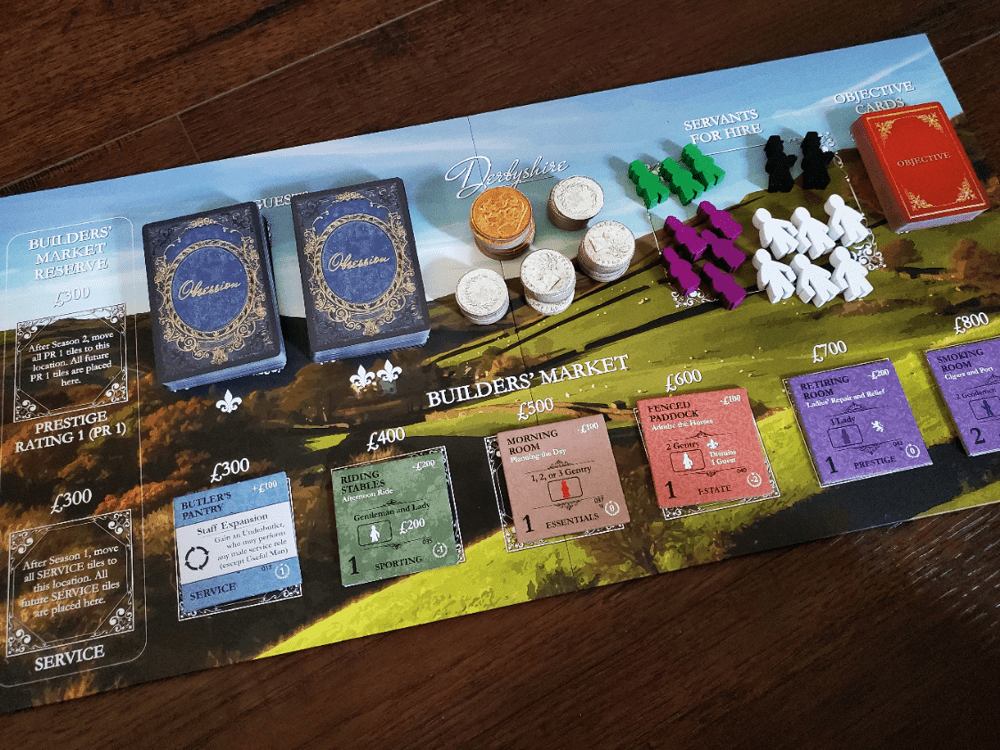
The Market may be managed in any of several ways. The base game keeps the Market fairly static, sliding tiles and refilling only as Activities are purchased. The Emily Brontë variation resets the Market at the start of each Courtship season. The Queen Victoria option removes the cheapest tile at the end of each Round, moving the Market steadily onward. We typically employ the Queen Victoria option, making the motions rhythmic and unforgettable while keeping variety alive.
Once the turn is complete, players clear their boards in preparation for the next Round. Servants are moved to their Expended location. Guests are sent to the personal discard pile. The Activity tile is removed back to its location on the sideboard, flipped if need be.
The Passing turn, when required, is nearly like a typical turn, though the Upstairs, Downstairs expansion introduced a new process that has since become the standard. On a Passing turn, players return all Servants to their Available status and return all Guests to the active deck, paying attention still to happenings on the Round track and in their Estates. There is then a choice of three actions: either Collect Money, Hire two new Servants from the available pool, or Refresh the Market. They may also then hit the Market for a new tile if desired.
Hiring servants becomes a necessity as the game progresses. As the Guests become more and more demanding, each often requires a Ladies’ Maid or a Valet in order to attend an Activity. If Service cannot be provided, they cannot be invited and their Favours remain untapped. Certain Servants are versatile, assuming fill-in roles when other positions are preoccupied or resting. In the Upstairs, Downstairs expansion, several additional Servants join the fray, bringing bonuses and special abilities to the mix. Building an appropriate staff is critical to success. An elite family estate must be ready for anything.
Satisfaction
Once each game, there is a National Holiday on the Round track. This is, by far, the most significant and potentially satisfying turn within Obsession. The National Holiday removes all Prestige restrictions, allowing each family to throw an Activity beyond their influence, to invite Guests out of their league, and to gain Favours in absurd abundance.
I would try to quantify all that one could gain from such a Holiday, but here’s the thing: It doesn’t matter. Ok, maybe it matters some. But if you’ve pressed into the Victorian wonder, rejoiced and recoiled at your Guests, and prepared your Service well, your unbridled happiness will help you realize the greatest goal of Obsession: simply pulling it off despite the often cruel hand of Fate.
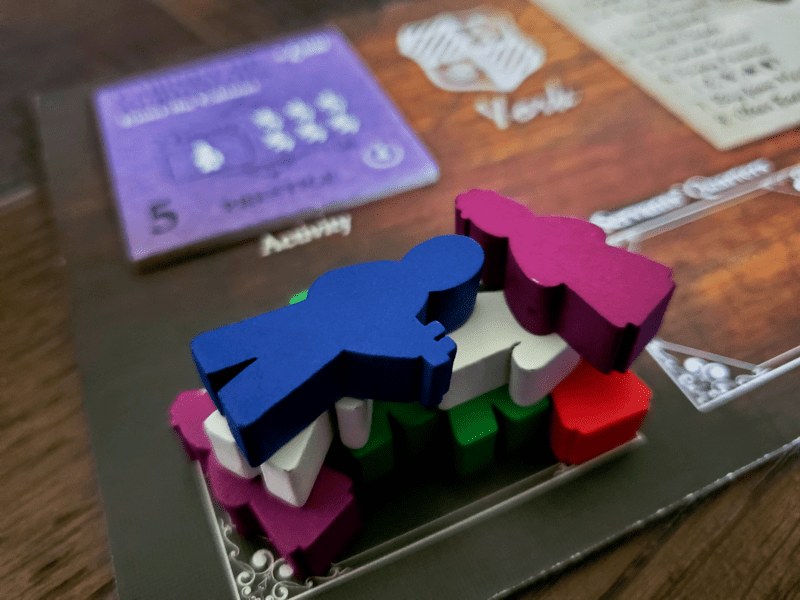
If there is a moment during Obsession when you will pull out your phone for a snapshot, it is during, or immediately after, the National Holiday. Leaving behind an exhausted pile of ten or more Servants, having obtained all the Guests have to offer to the great gain of your family name? THAT is what the game is all about. The Victory Points, in all honesty, are in many ways an afterthought.
Estimation
Yes, Obsession is a game, but I honestly see it through a wholly unique lens among the designs in my collection. It is an experience, and a mighty fine one at that. It is one of three 10/10 titles at this point. It was only the second game I ever dared call a ten. I adore this game from top to bottom, inside out.
But…
Obsession is a product of the era it seeks to emulate. It is an expression of the Victorian literary ethos. First and foremost, it is riddled with randomness—it must be in order to be genuine. Fate is a key figure in the story, imposing her impossibly unpredictable whims upon every situation. Activities are drawn from the bag into the Market at random. You may never see the precious tile you’ve desperately wanted from the beginning. In fact, there will likely be an endgame Objective card in your hand that depends on something so specific as to fill you with rage from shoes to bowler at the unfairness of it all. Yet this is the spirit of the game. It is as much about finding out what happens as it is about reacting.
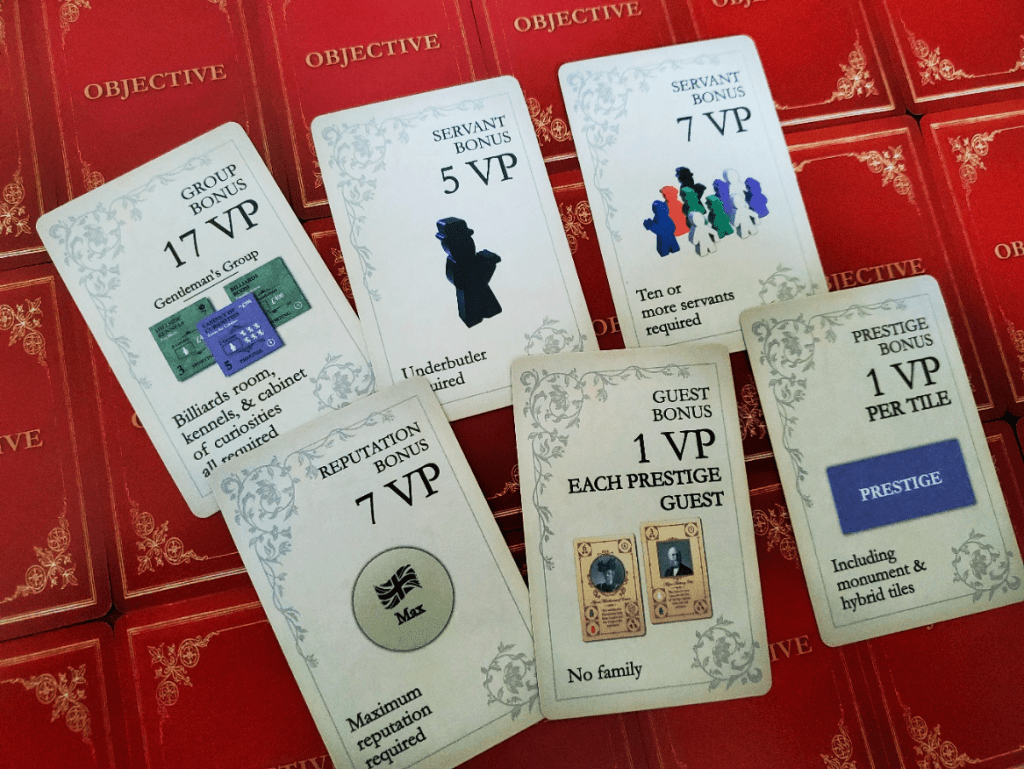
Guests, too, are forced upon you by the hand of Fate and the blind draw. Occasionally you draw two and choose one, but more often you simply interact with the wider world and see who is roped into the mess. At times you can dismiss a Guest from your deck, but counting Guest card Victory Points at the end of the game is as much an exercise of subtraction as it is addition. Some of these folks are nasty. James Hereford, Esq. is a scheming scoundrel who costs you £100 and two Victory Points by his presence. He brings another Guest, but from the Casual pile that is filled equally with saints and troublemakers. Dear old Anne Hawkins, the American heiress, brings you £800 while costing three Presige and as many Victory Points. That’s a useful mini-fortune, and a pain in the cumberbund. Anne is one of my absolute favorite cards because she embodies the consequence of Fate’s strong hand.
The Jane Austen variation on Courtship withholds drawing the Fairchild preference until after the season has been played. Gamer heads explode the world over at the thought of issuing such pivotal rewards without anyone’s prior knowledge. The Charles Dickens variation suggests assigning the location of each Courtship season by a roll of the die, stretching and compressing efforts until they no longer resemble the rhythms of the base game. You must understand that in Obsession, these choices not only make sense, they ennoble an already swollen personality to the point of rupture. They are the lifeblood of the game’s setting, and they simply must be tried in the name of appreciation.
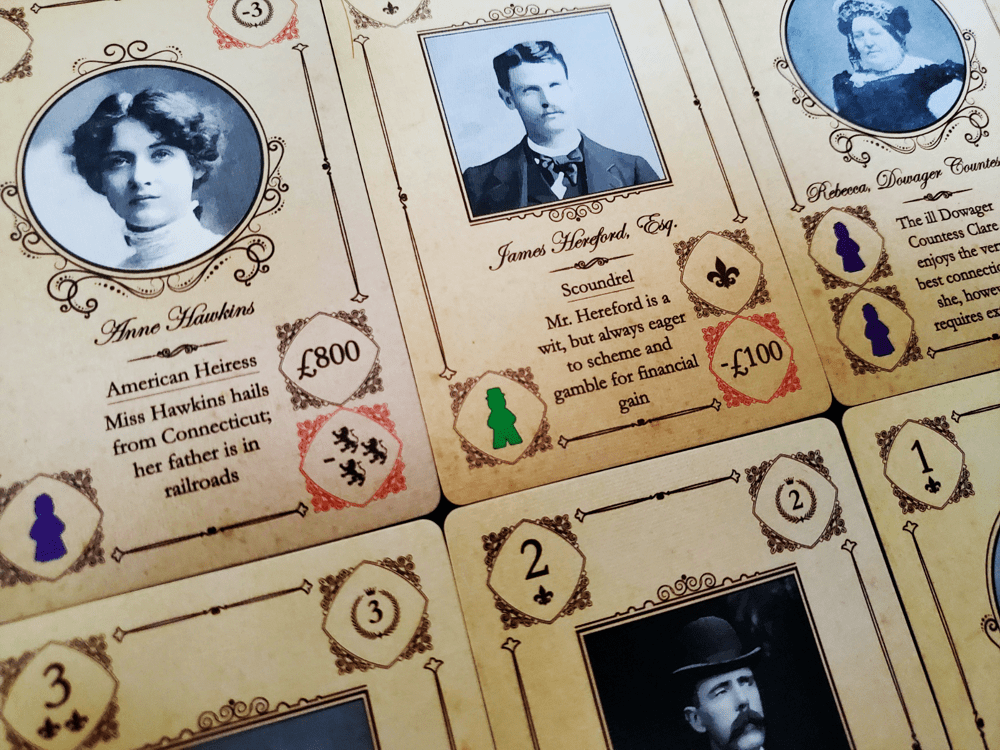
Endgame scoring is extensive on a Bunny Kingdom level, stretching at times into the 200+ range by bits and pieces—only without the luxury and help of periodic in-game tallies. Tiles must be added. Guest cards, which can number more than thirty, must be added (and subtracted, let’s not forget). Those nearly impossible Objective cards must be added. Reputation must be scored according to a chart and added. Servants must be counted and scored. Money, though worth very little, must be scored. Courtship bonus cards, earned along with the Fairchild card at each Courtship Round, must be scored.
A note on the Objective cards because, despite their occasional cruelty, they are handled marvelously. Each player receives multiple Objectives at the beginning, but they remain in flux until the end. Twice additional cards are drawn in, and at every Courtship Round one is discarded. This give and take results in crafting a pair of Objectives best suited to the individual’s estate as the last pound flies. Brilliant.
From a gameplay perspective, the most enjoyable aspect of Obsession might be the tense decision-space around selecting an Activity. There are always options, sometimes each with great opportunity. But determining which would best serve the family according to the timing of the Round track, the preferences of the Fairchilds, and the balance of the estate makes for a wonderful bit of play and a delightful mirror of that world.
Continuation
If you find yourself drawn to Obsession, I commend you to consider the following. Echoing the advice of Dan Hallagan, start with the base game. Plan to play it multiple times to gain familiarity and explore the suggested variations long before you ever crack the seal on the expansions.
Upstairs, Downstairs is all about the Howard family and a bevy of new Servants, each with a mild game-breaking strength. The Cook, by way of an excellent menu, enhances the family reputation allowing for Activities and Guests typically beyond reach. The Hall Boy increases Monetary Favours, fills in for the Butler and maybe the Footman. The Head Housemaid screens those Guest cards to help build a less punishing deck. The Useful Man is just that. He gets around and makes life easier around the estate.
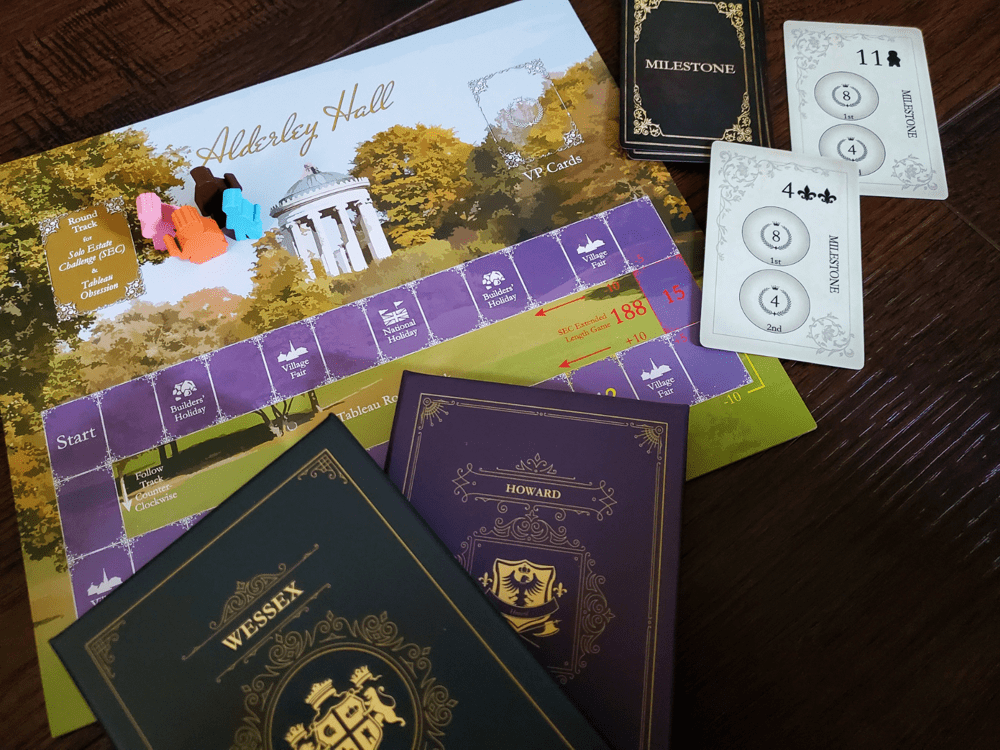
The Wessex expansion adds the Wessex family to the mix along with a handful of new tiles. Little else changes, but I will admit every family takes on life within the game. The expansions push the player count to six, but I wouldn’t unless you have a lot of time on your hands. The four-player base game already pushes past two hours with all that extraneous time enjoying flavor text and card photos. There is no more player interaction, which is limited anyway, so it’s just a longer session. The strong upside is the chance to relish the thematic experience and catch up on life in the downtime, but only if that’s your thing.
Distinction
Obsession includes a full solo mode that welcomes an Automa family to the social scene. A wide variety of Opponent cards are included in the game to create a variety of difficulties and experiences. A twenty-sided die is used in conjunction with the card to determine the Activities hosted, the Market tiles purchased, and the overall game priorities toward the Fairchilds. The card features a starting score to which Courtship rewards are added as well as the Victory Points for the Fairchild card should the Automa win. The solo mode is a direct competition against the final score of the artificial opponent, maintaining the tense and Fated feelings of the base game. More than anything, the solo experience is a chance to sit with a story of sorts, enjoying the world that surrounds and aspires to Alderley Hall.
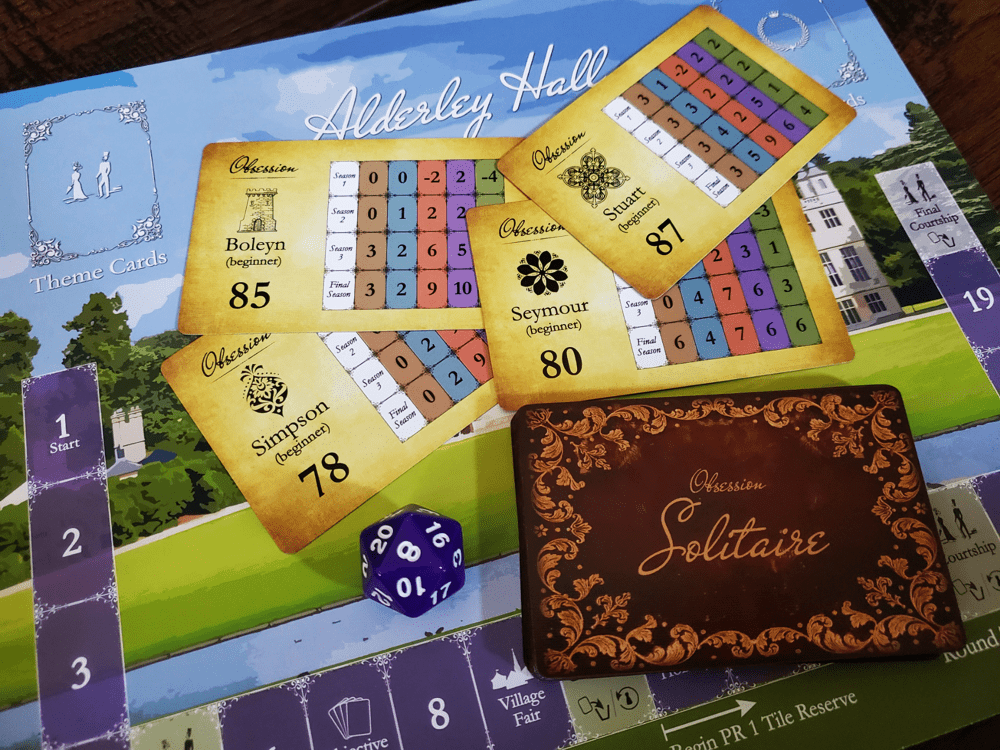
Extrication
I know. It’s time to finish. I knew at the outset that I would have too much to say. But I also believe this is the sort of game you must believe in before you fork over the hefty price of a oft-impossible-to-find copy. If you search in between print runs, which is the case as I write this, you will either wait months or pay dearly for a used copy to visit Alderley Hall. During seasons of plenty, you can pick up the total package for about $120. It’s worth the page count to investigate in advance.
Obsession is not a roleplaying game by any means, but it is the sort of title that takes on as much life as you invest. Its capacity to become its thematic material is remarkable. I firmly believe it is not for everyone, but those for whom it was designed will dive in whole-heartedly and never feel the slightest pang of regret.


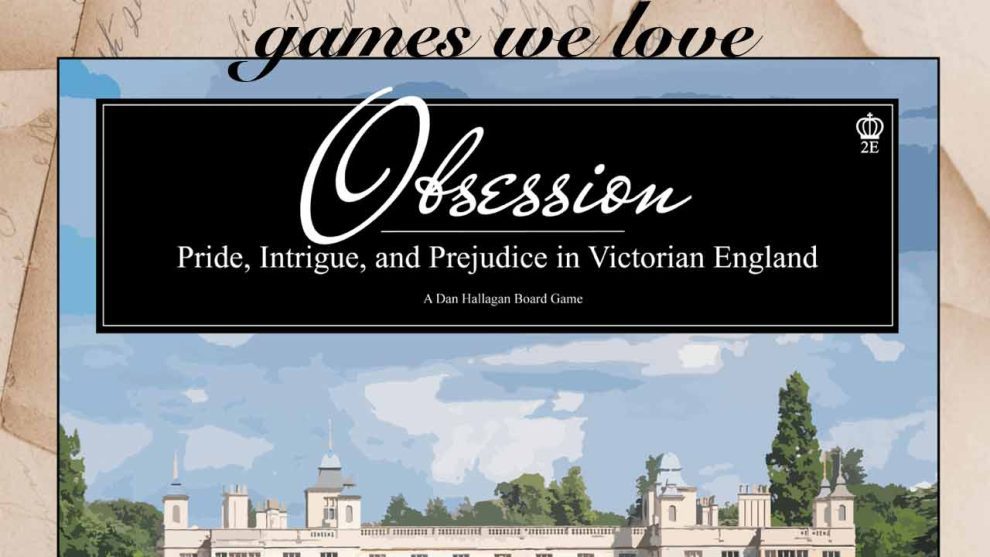








Lovely, well-nuanced review of a fantastic game, Bob!
Thank you Alf! Obsession is still the go-to play when my wife and I share a game date night. I’m excited for the forthcoming expansion materials.
(Can’t wait for your next design!)